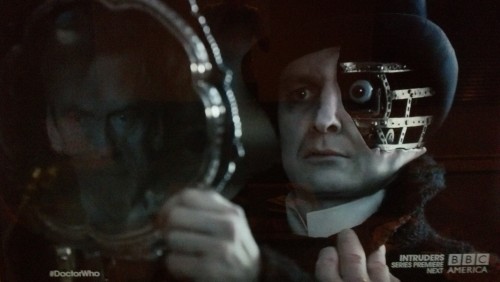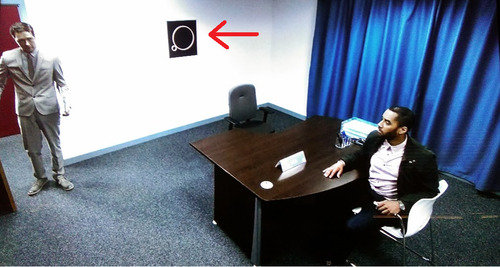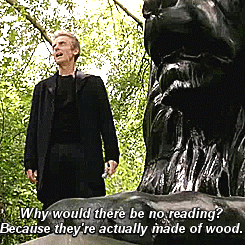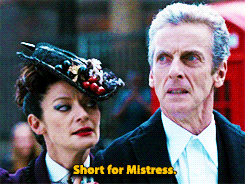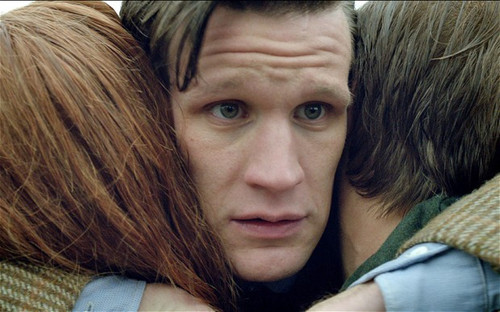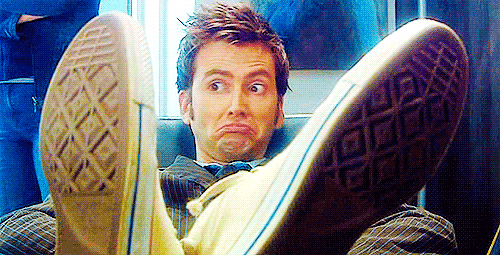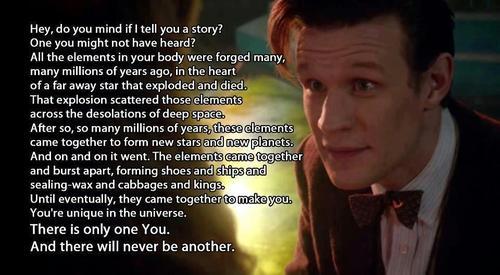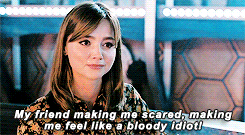
If I were being honest, I’d say that I put off writing up a reaction to the season 8 finale, “Death in Heaven,” because I found myself suddenly neck-deep in grad school applications. Instead, I’ll insist that I totally planned it this way so that we could all have an opportunity to stew in the shocking events of the season finale for a bit before approaching this year’s Christmas special. At the same time, we’d also need a refresher of what went down in the season finale given the month-and-a-half long gap. And lo, because you asked so nicely…here goes:
When it comes to serialized dramas, it’s difficult for recappers to present a perfectly coherent write-up of any given episode of a series because we, like any viewer, rarely know how it’ll all end. No one outside of the show itself knows how the plot will be resolved (or not) and how the characters will get through it all (or not). Tracking a character’s arc is much easier when you’re presented with a larger store of reference points. This has been especially true pertaining to the current season of Doctor Who, a season that was weak on overarching storylines and heavy on character development. So, in lieu of a scene-by-scene recap (the likes of which I tend to avoid anyway), I’m going to focus instead on several key characters.
**
Let’s start with Miss Clara Oswald, since the upcoming episode is likely to be her last. “Death in Heaven” opened up with a bizarre sequence in which Clara pretends (once again) to be the Doctor. This time, she picks up the charade in order to save her own life, cunningly convincing the approaching Cyberman that she is “strategically valuable” because she’s “not human.” Clara drags out the act for quite a while, word-vomiting detailed facts about the Doctor’s lives so quickly that I had to pause repeatedly just to make sure I could absorb all the information.
Going back to review these scenes after we learn definitively that Clara was faking casts the whole thing in an even stranger light, since it just goes to show how shockingly well she knows the Doctor. She’s like…a Doctor Who Superfan, rattling off facts at the speed of light. And that’s where it gets interesting, because Clara is decidedly not like any of the Doctor’s past adoring companions. As Kyle Anderson over at Nerdist phrased it: “While other companions fall in love with traveling with the Doctor, or possibly fall in love with the Doctor himself, Clara had fallen in love with the idea of being the Doctor.”
Now that’s a compelling character arc.
If you’ve been reading these posts, you’re probably aware of how low my opinion is of Clara. But my dislike of the character is, far from being an indictment of her writers, actually a commentary on how well she’s written—I wouldn’t bother hating on someone who didn’t feel so damn real. Clara is an egotistical control-freak. But the Doctor is, too, so why don’t I feel such animosity towards him?
Well…I do. The Twelfth Doctor is definitely a more difficult Doctor to love. But Clara’s narcissism feels more egregious; she repeatedly shirks her earthly responsibilities (*cough* Danny) in order to go gallivanting around the universe because that is the only activity that appeals to her astronomically high sense of self-worth. The interesting thing about Clara, though, is that she is highly intelligent and extraordinarily capable, so her egoism is not pure bluster. Which brings us back to the Doctor. Every time the Doctor whips out his “I’m the Doctor” line, he is implicitly insisting that he is better.


Otherwise, that sentence would have no power. He’s not just introducing himself– he’s laying down the law, with three simple words.

And, let’s be honest: He really is better at everything. He’s THE DOCTOR!
At any rate, it’s pretty easy to imagine that if Clara had been born under different circumstances (say, on Gallifrey), she would be a near-exact replica of the Doctor. The fact that she, the Impossible Girl, actually was born under several different circumstances in several different eras only adds to her lone wolf aura—a maverick status that once again connects her to the Doctor. But it is both characters’ insistence that each one “knows better” that proves to be the most explosive aspect of their treacherous relationship. (In my last recap, I noted the symbolism of Clara and the Doctor ending up in a literal (though un-real) volcano at the beginning of “Dark Water.”) As Kyle Anderson put it: “Two Type A people in one TARDIS.” Which frequently plays out exactly as you would expect it to play out.

That’s why this season felt a bit off-kilter—these two opposing forces were constantly butting heads, and Clara, not the Doctor, was often the one who came out on top. See: every scene in which Clara pretends to be or actually acts as the Doctor, which Moffat attributes to Clara “think[ing] the show is called Clara” instead of Doctor Who.
All of this infuses their goodbye scene in the diner at the end of “Death in Heaven” with an undercurrent of tragedy, because both Clara and the Doctor seamlessly fall back into their habit of blatantly lying to each other. The Doctor tells Clara he’s off to Gallifrey, despite the fact that Missy’s coordinates allegedly didn’t work, and despite the utter frustration he expresses while alone in the TARDIS. Clara, in turn, lies to him about Danny returning from the dead, despite the emotionally walloping scene beforehand in which Danny sends the boy he killed in war back in his place. After the final lies have been said and the final goodbyes are in place, Mr. “No Hugs!” allows Clara that one ceremonial formality, at long last explaining the reason for his mistrust of hugs: “It’s just a way to hide your face.” Clara agrees, gazing regretfully into nothingness, lying by omission, as the man on the other end of the hug does the same.

(x)
**
Next up: Osgood! Ah, dearly departed Osgood. Was Osgood her first name or her last name? Now we’ll never know.
Osgood was a much-beloved fan-favorite, despite the fact that she only appeared in one other episode (“Day of the Doctor”), and for good reason: Osgood was, essentially, an on-screen representation of the collective Doctor Who fandom. She worshipped the Doctor (sometimes literally), not-so-subtly cosplayed the different Doctors’ idiosyncratic attire (Tom Baker’s scarf in “Day of the Doctor,” Matt Smith’s bowtie in “Death in Heaven”), and fostered a fervent desire to travel through time and space as the Doctor’s companion (“Something for your bucket list,” the Twelfth Doctor says, and a starry-eyed Osgood quickly takes a puff of her inhaler).
Given Osgood’s status as the fandom incarnate, it’s not surprising that the character found her way into real fans’ hearts. And given her status as a fan favorite, it’s not surprising that Steven Moffat would use her death for maximum shock effect.
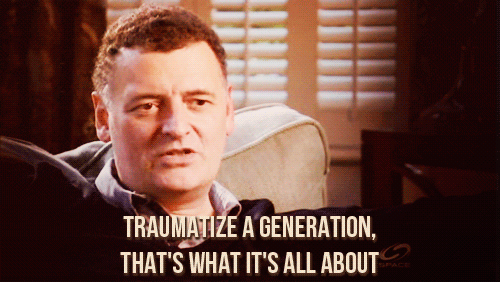
As Dr. Evil himself explained, vaporizing Osgood was all about helping us realize just how psychotically twisted Missy is: “The Master-stroke-Missy would have to kill somebody we liked in the most cruel, heartless, and terrible way to absolutely say that this person is shockingly evil.”
Thanks, Moff. We got it now.
There are two blatant problems with this: 1) It’s a classic case of fridging, so Moffat is not doing himself any favors in the ever-narrowing eyes of his feminist critics, and 2) He seems to be vindictively biting the hand that feeds him by offing the audience surrogate, and doing so “in the most cruel, heartless, and terrible way,” making her death into some sort of egotistical power trip—for Moffat, not for Missy, as was his iorigial intention.
**
Danny Pink: Still dead and buried.
Well, still dead, at any rate. But he sure as hell wasn’t resting in peace.
“Danny’s a Cyberman. And he’s crying.”
Doctor Who is really killing it (no pun intended) with the three-word-sentence gut-punches, eh? You see, for the average 21st-century viewer, Daleks and Cybermen are about as scary as Dark Helmet. But Moffat injects the mythos of the Cyberman with a hefty dose of existential terror by creating the idea of a Cyberman that can feel. Gone is the inhuman automaton; enter the guilt-ridden, bone-weary, deadened but not dead Danny Pink. The Cyberman is crying. How on Earth are we supposed to approach that?
But first: The Doctor makes a house call. Or a graveyard call, as it were.
Often, characters on this show fall into the trap of spouting platitudes at each other, lessening the weight of their words by giving the impression that we’re being lectured at from all angles. But whenever Danny and the Doctor interact, their ideas crackle with genuine intensity—and truth. At the end of “The Caretaker,” Danny calls out the Doctor as being an officer—that is, a soldier who doesn’t get his hands dirty. He sees right through the Doctor’s hypocrisy.

(x)
…or, perhaps “hypocrisy” is too strong a word—“hypocrisy” would be the term to use if the answer to the Doctor’s season-long query, “Am I a good man?” were “No.” But the Doctor is the hero of our Whoniverse, and so the answer to that question must be “Yes”—or at least, as Clara says, “You try to be, and I think that’s probably the point.” So, then, how to reconcile the Doctor’s values with the blood that he so meticulously wipes off of his hands? How to address Danny Pink’s very valid concerns? This is a question that the show has been dealing with all season, and perhaps all series as well. It’s a question that, like “Doctor Who?” is essentially unanswerable.
Back to the graveyard: Danny asks Clara to turn on his emotion inhibitor, because the pain is too much for him. In doing so, Clara will effectively kill him; he will become a “complete” Cyberman and Danny Pink will be lost forever. She calls to the Doctor for help, and the Doctor, of course, opposes switching on the inhibitor because “Pain is a gift.” An old and somewhat wearying argument, but one that I think was most delicately handled in The Fault in Our Stars.

(x)
I was wary of revisiting this maxim, since it so treacherously toes the line between profound and ludicrous. But what the Doctor says next intrigues me: “Without the capacity for pain, we can’t feel the hurt we inflict.” There’s truth to that, I believe. But for Danny, this makes what the Doctor does even worse: You can feel the pain you inflict, he effectively accuses the Doctor, yet you inflict the pain anyway? For Danny—and for us—it’s hard to accept that that’s what a good man would do.
But it is Danny who has the last word here, finally throwing in an argument for the silent, oft-demonized soldier: “You will sleep safe tonight,” he says to Clara, as he rises (to heaven, finally?) with his fellow Cybermen, sacrificing himself to protect all of humanity. No guns, no weapons, no violence, no soldiers, the Doctor always insists, implying quite clearly that soldiers are somehow inherently bad. But Danny demonstrates here the ideal role of a soldier: not to kill, but to protect. (In light of all that has happened across America since Ferguson, this whole theme is unfortunately very, very relevant nowadays.)
This sequence began with the Doctor’s rather cringe-worthy “Love is a promise” line, but Danny Pink, bless him, carries it out to an emotionally and thematically satisfying conclusion. “This is the promise of a soldier!” he says, and as has been the case all season, Murray Gold’s gorgeous score lends these words additional gravitas. Danny’s exchange with the Doctor in this episode mirrors scenes from “The Caretaker” in another way as well: he asks Clara to tell him if the Doctor ever pushes her too far, and when Clara tells him “it’s a deal,” he corrects her: “No, it’s a promise. And if you break that promise, Clara, we’re finished.”
Sorry, it just started raining on my face.

**
Missy, Missy, Missy. By this point, everyone has already said all there is to say about the Doctor’s wackiest longtime foe. But I really can’t say enough about how deliriously, anarchically bonkers Missy was, and how delightfully well Michelle Gomez played her. Definite shades of the Joker and Moriarty in that performance, along with, of course, vintage Master craziness.
Picking a favorite Missy line or a standout scene would be impossible, because every word that emerged from her lips had me bubbling over with hysterical (in both senses of the word) laughter. And although her annihilation of Osgood was certainly upsetting, I was almost enjoying her performance too much to notice just how upset I really was.
This episode made me wish that we could have seen more of Michelle Gomez’s character throughout the season. But it also made me think (hope?) that we haven’t seen the last of Missy, because an actress like that is simply too perfect to waste on a single season finale.
Yet despite all of Missy’s loopiness, I noticed that everyone seamlessly took up the female gender pronoun when talking about her, even when referring to Masters of the past. Nice assurance that people in the Whoinverse will respect your life choices—even if you are a psychotic supervillain.
Oods and Ends:
- Missy: “Cybermen don’t just blow themselves up for no good reason, dear. They’re not human.” Damn. Missy drops a literal truth bomb.
- So now Moffat has facilitated a fear of rain as well. Add it to the list…


